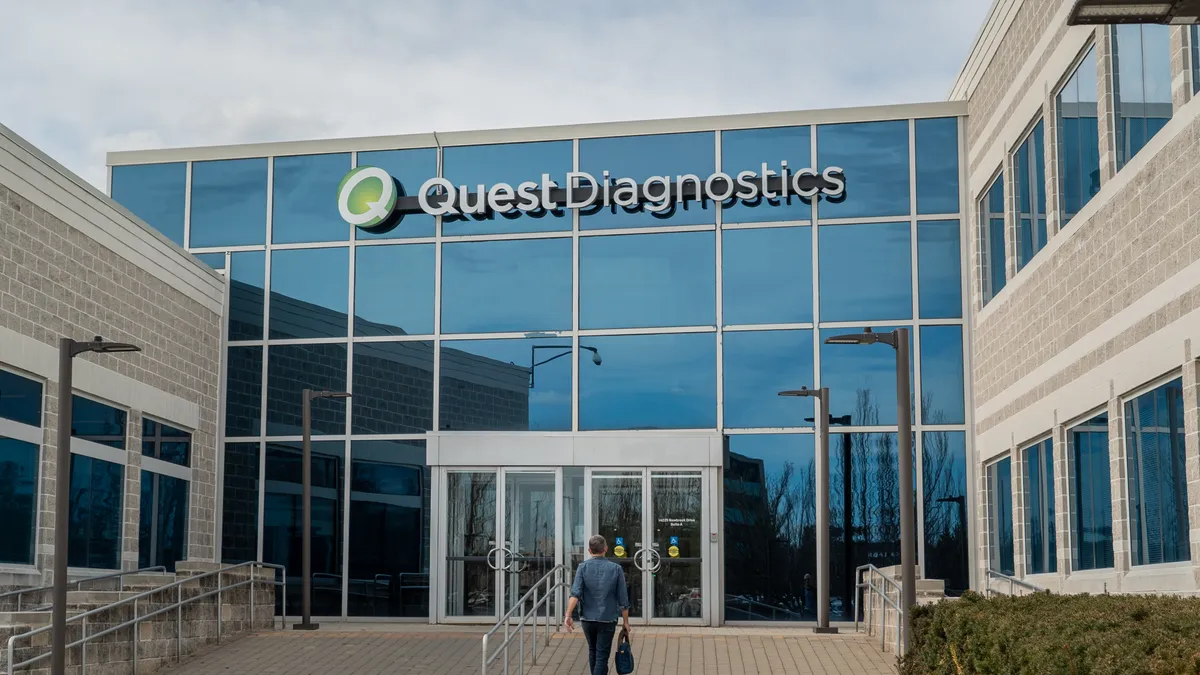Dive Brief:
- Quest Diagnostics on Thursday confirmed second quarter revenues totaled $1.83 billion, a better-than -expected 6.4% decline from the prior year given pandemic headwinds. Base test volumes dropped 34% during the period compared to a year ago, which was partially offset by strong demand for coronavirus molecular diagnostics.
- While CEO Steve Rusckowski told investors on Thursday's earnings call that the quarter was "one of the most challenging periods" for the company, Quest reinstated its outlook for 2020, expecting net revenues of $8 billion to $8.6 billion, which would top the $7.73 billion it brought in in 2019. It previously withdrew yearly guidance on March 31 due to COVID-19 uncertainties.
- Nonetheless, CFO Mark Guinan warned that Quest's base testing volumes will remain below prior-year levels for the remainder 2020. In addition, Rusckowski acknowledged the headwinds the lab network is facing in trying to reduce the turnaround times for COVID-19 test results.
Dive Insight:
Faced with increasing demand nationwide for molecular diagnostic testing for the coronavirus, Quest and rival LabCorp continue to experience test processing delays. Rusckowski reiterated an update from Monday that non-priority patients face average wait times for their test results of at least seven days, while "priority 1" patients, or those considered critical, are now having to wait an average of about two days for results, double the one-day turnaround reported a week ago.
By comparison, LabCorp reported July 19 its average wait time for test results had dropped from four to six days to three to five days.
"In recognition of the magnitude of the current demand for testing, we have asked customers to help prioritize patients we test for COVID-19 at this time," said Rusckowski on Thursday's call.
Specifically, Quest has asked healthcare providers to limit the number of specimens they forward for patients who are likely to be at lower COVID-19 risk. In addition, the company said recent FDA authorizations will help the lab network to expand coronavirus testing capacity to meet increasing demand.
FDA on July 18 granted emergency use authorization to a Quest coronavirus test as the first allowed for sample pooling, a method meant to screen more people using fewer testing resources.
"This technique, which is commonly used with blood banking, will help expand capacity especially among populations with low incidence," Rusckowski said on Thursday's call.
He also referenced EUAs awarded last week for the use of Roche and Hologic testing platforms with Quest's COVID-19 molecular diagnostics self-collection kit. Three SARS-CoV-2 assays were given the agency's greenlight so users can self-collect nasal swab samples at home while being observed by a healthcare provider via telemedicine.
Rusckowski believes that trio of tests, as well as the FDA nod to sample pooling, will help Quest reach its goal of performing 150,000 molecular diagnostic tests a day by the end of July. Currently, the company's testing capacity is 130,000 molecular diagnostic tests per day.
"We expect demand for molecular COVID-19 testing to remain high at least through the third quarter," said CFO Guinan. "COVID-19 serology testing also continues to help offset declines in base testing volumes."
While second-quarter revenues were down year over year, Guinan said the results were stronger than the company communicated in June. Guinan attributed the results to a better-than-expected recovery in base testing volumes and growing demand for COVID-19 testing services.
"Base volume trends began to improve in May, down more than 30%, as stay-at-home measures were lifted and many hospitals reintroduced elective procedures and some physician offices reopened. The base volume recovery continued in June, down less than 15%, as the trends in May gained momentum," Guinan said.
But some of that momentum may already be at risk of reversing.
Going forward, while Guinan reported that base volume declines were in the "high single-digits" at the end of June, he warned that "due to the recent spike in COVID-19 cases across the country, and the rollback of several state reopening plans, we have seen a slight softening of our base business in early July."
Reflecting Quest's stronger financial position, Rusckowski said the company has reversed the "vast majority" of workforce actions it took in April to mitigate the negative impacts of COVID-19, including furloughs, reduced hours and pay cuts for salaried employees.











